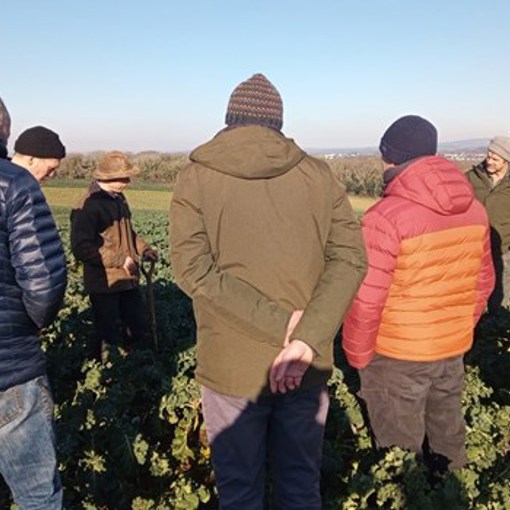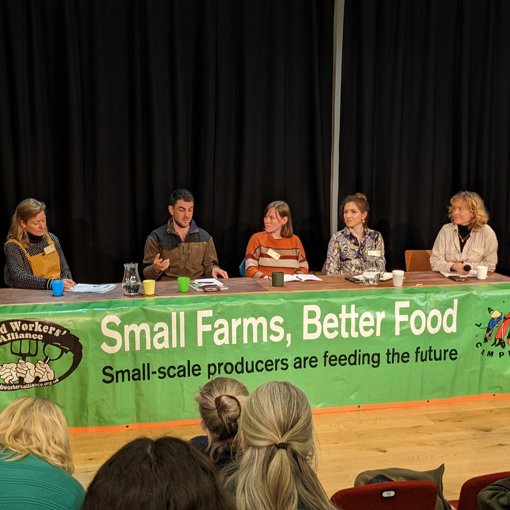Eliminating peat from propagation using growing media blocks
In November a new one-year field lab started, looking into eliminating peat from propagation using growing media blocks. It builds on previous work funded by Innovative Farmers and The Pebble Trust to develop a peat-free growing medium suitable for producing propagation blocks for vegetable and salad transplants. The project involves three growers, based in Fife, Perthshire and Moray, with research support from SRUC (Dr Robin Walker) and project management from Earthcare Technical (Dr Audrey Litterick).
The growers:
- Wester Lawrenceton Farm, Forres, Moray (Pam Rodway)
- East Neuk Market Garden, St Monans, Fife (Connie Hunter and Tom Booth)
- Tombreck Farm, Lawers, Aberfeldy, PH15 2PB (Rachel Wake and Ian Machacek)
Background
The general feeling amongst growers experimenting with the manufacture of peat-free growing media is that it is very difficult to get the textures and physical properties required for producing blocks on any scale without peat. If the group is successful in producing a substrate which has suitable chemical and physical properties, the impact on the sector could be significant, as it would allow commercial growers to produce their own growing media, whilst also eliminating peat and plastic from the propagation stage.
The trial will build on previous work, which compared five peat-free growing media recipes for seed sowing based on locally sourced feedstocks in order to determine which were most suitable for making propagation blocks for raising seedlings (as outlined in the criteria above).

Project Aims
The aim is to eliminate the use of peat and minimise the use of plastic in the propagation stage of vegetable production, through the use of nursery-produced growing media blocks based on “hot bin compost”, soil, leaf mould and other constituents. The propagation blocks will:
- Contain only constituents which can be sourced locally/from within Scotland
- Be peat-free
- Be suitable for blocking (and therefore plastic free)
- Be suitable for raising vegetable seedlings (e.g. adequate nutrient content)
- Be free of viable weed propagules.
Project Plan
The three trials hosts will begin making compost in November 2023, with a view to making growing media in spring 2024 which can be used to form blocks for vegetable transplants in that same season. The growing media will be tested at a UK laboratory for a series of key quality indicators and performance of the growing media and the vegetable/salad transplants will be assessed during the season.
Definitions
There is frequent confusion surrounding the word “compost”, which has two broad meanings in the UK. The word “compost” can mean:
- A stable, sanitised soil conditioner or constituent for growing media, made from biodegradable organic materials through a composting process. [Composting can be defined as a controlled, aerobic (with oxygen), microbial decomposition process which involves self-generated heating]. Compost, as defined here, can be made at any scale, from garden compost heaps and bins to large commercial composting systems designed to take municipal food and garden wastes. In this project, we will only use the word compost for the material we produce in hot bins for use as a constituent of growing medium (see below).
- A growing medium in which seeds are sown or young plants are grown in containers. It’s usually bought and sold in plastic bags, though larger quantities can sometimes be sold in bulk bags. In this project, we will use the term “growing media” to describe the material we manufacture to make blocks from a mixture of compost (produced in hot bins) and other locally-sourced ingredients.
Why do definitions matter?
Definitions matter because the differences between true composts and growing media are considerable. The compost made in a well-run compost heap or hot bin may look the same as that which you might buy in a colourful plastic sack and use to sow seeds in or grow young plants in, but it is not. Home-produced compost is much too nutrient-rich for use alone as a growing medium, and the physical structure is not suitable. In fact it is chemically and nutritionally similar to farmyard manure and few people would try to sow seeds in that! True composts are best used as nutrient-rich fertilisers and soil conditioners OR as a constituent of growing media, which should be mixed with low-nutrient materials of suitable structure for the intended use and container size. Using true composts as growing media frequently results in poor seed germination, poor seedling growth and financial loss.
Future Guidance Notes
Future guidance notes will cover:
- Methods the project team are using to produce compost in hot bins
- Methods the project team are using to produce growing media and blocks for the trials
- Methods the project team are using to sow seeds, manage the transplants and assess performance of the blocks and transplants in the trials
- Results of the trials and potential for producing home-made growing media blocks for propagation using the methods described.
Get involved
The project team is keen to engage with others. Growers, horticultural scientists and other interested parties are invited to sign up to receive:
- Guidance notes on techniques being used in the project
- Project updates
- Invitations to online and in-person meetings.
To find out more and to get involved, visit the field lab portal on the Innovative Farmers website, where any farmer can join the network and find trial information and findings for free.
Research Institution: SRUC
Co-ordinator: Dr Audrey Litterick, Earthcare Technical


